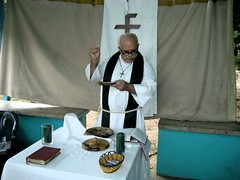| Image via WikiPedia |
Trinity Sunday and Father's Day fell on the same date this year (June 19), so there was an opportunity to talk about the person of God the Father and His relation to earthly fathers. That is, earthly fathers are mortal reflections of the our heavenly Father. As it is the divinely ordained role for earthly fathers to protect and provide for their children, God the Father provides and protects us in ways that no human father can. Thus in the prayer that our Lord Jesus taught us, we address God as "our Father" and petition Him for all our daily needs.
In the Large Catechism, Luther writes of the first article of the Apostle's Creed, "We also confess that God the Father has not only given us all that we have and see before our eyes, but daily preserves and defends us against all evil and misfortune, averts all sorts of danger and calamity; and that He does all this out of pure love and goodness, without our merit, as a benevolent Father, who cares for us that no evil befall us."
But the Father is only one of persons of the Trinity that we celebrate on Trinity Sunday, so after we recited the Athanasian Creed, I spoke of the relationship between the Father, the Son and Holy Spirit as well.
The Athanasian Creed has always been my favorite of the three great creeds, It has a poetic rhythm that the Apostle's and Nicene creeds lack, but it also is the longest and most complex of them. It is named after, and in times gone by, was attributed to Athanasius, the fourth-century bishop of Alexandria, Egypt, who was the great champion of trinitarian theology agains the heresy of Arianism. Much like the Jehovah's Witnesses of our time, Arius and his followers believed Jesus was the incarnation of a created being, superior to humans, but not equal in divinity to God the Father.
However, it is very doubtful that the creed as we know it was written by Athanasius. There are several reasons for this, but the most important is that the Athanasian Creed specifically addresses heresies that did not emerge until after Athanasius' death (although Arianism still was alive and well in the fifth century, when the creed probably was written).
The doctrine of the Trinity was attacked on several fronts by false teachers because of its importance to our understanding of the person and unique authority of Jesus Christ. We have the revelation of Father, Son and Holy Spirit in the New Testament (although there are hints of it in the Old Testament as well) so that we may understand how God could be walking around on earth incarnate as Jesus, while still maintaining order in the universe as the Creator of heaven and earth. Or how Jesus, as true God could take our place on the cross to pay for our sins, while as true man asking the Father, "My God, my God, why have you forsaken Me?" Or how God the Holy Spirit can live and act in and through each of us while the Son is no longer with us in visible form.
The Holy Trinity is not a useful hypothesis, but divine revelation. We can understand what it is not, but not completely comprehend what it is As we read in our epistle for Trinity Sunday (Romans 11:33-36, "O the depth of the riches both of the wisdom and knowledge of God! how unsearchable are his judgments, and his ways past finding out!"
We can only know God from what He reveals to us about Himself. He has revealed something of Himself in His creation (thus, as Paul writes in Romans, none may plead complete ignorance of God and His Law), but most of what He has revealed about Himself was revealed first to the prophets of the Old Testament and later to the apostles of Christ. And the apostolic teaching is none may know the Father except through the Son and none may know the Son except through the illumination of the Holy Spirit, sent by both the Father and the Son.
There is a hymn written close to the time of Athanasius, that beautifully expresses the doctrine of the Trinity. The English version, "Of the Father's Love Begotten", is often sung at Christmastime. Unfortunately, we do not have a Spanish translation in the Spanish hymnal that we use in La Caramuca. This is quite ironic, because the author was what we would call a Spaniard today. His name was Aurelius Clemens Prudentius, and he was born in 348 A.D. in what is now northern Spain. He studied law, served as a judge and twice as governor of a province, and finally received high office in the court of the Emperor Theodosius. He retired from public life at age 57 to devote his time to writing Christian poetry.
"Of the Father's Love Begotten" is a translation of "Corde natus ex parentis", set to "Divinum Mysterium," a 12th Century plainsong (a single melodic line without harmony).
Of the Father's love begotten
Ere the worlds began to be,
He is Alpha and Omega,
He the Source, the Ending He,
Of the things that are, that have been,
And that future years shall see
Evermore and evermore.
Oh, that birth forever blessed
When the Virgin, full of grace,
By the Holy Ghost conceiving,
Bare the Savior of our race,
And the Babe, the world's Redeemer,
First revealed His sacred face
Evermore and evermore.
O ye heights of heaven, adore Him;
Angel hosts, His praises sing;
Powers, dominions, bow before Him
And extol our God and King.
Let no tongue on earth be silent,
Every voice in concert ring
Evermore and evermore.
This is He whom Heaven-taught singers
Sang of old with one accord;
Whom the Scriptures of the prophets
Promised in their faithful word.
Now He shines, the Long-expected;
Let creation praise its Lord
Evermore and evermore.
Christ, to Thee, with God the Father,
And, O Holy Ghost, to Thee
Hymn and chant and high thanksgiving
And unending praises be,
Honor, glory, and dominion,
And eternal victory
Evermore and evermore.
 New communion set in service
New communion set in service My mother gave us some money to buy a chalice and platen in membory of my father, who died in 2000. I had hoped to introduce the new chalice and platen on June 19, but the logistics of delivery did not allow me to do so until the following Sunday, June 26. Thanks, Mom, and thanks to former missionary Richard Schlak for bring the set to Caracas from the United States.
My mother gave us some money to buy a chalice and platen in membory of my father, who died in 2000. I had hoped to introduce the new chalice and platen on June 19, but the logistics of delivery did not allow me to do so until the following Sunday, June 26. Thanks, Mom, and thanks to former missionary Richard Schlak for bring the set to Caracas from the United States.We also are grateful to the Crosswalk Sunday School of St. Michael's Lutheran Church, Bloomington, Minnesota, for a donation that allowed us to buy materials for the preschool and afternoon tutoring programs, as well as school uniforms for some of our older youth.
 |
| Sandro Perez, Jeison Arellano, Pedro Santana, Oriana Montoya. |


No comments:
Post a Comment